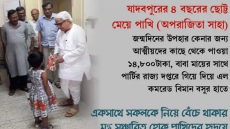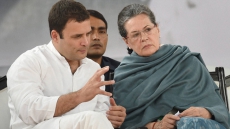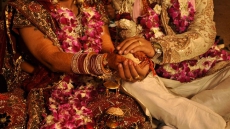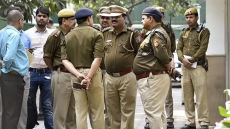The Supreme Court on Friday ruled that women in the age group of 10-50 could also enter the famed Sabarimala temple in Kerala, a decision that caused dismay among the devout.
In a majority 4:1 judgment, the apex court said the ban on women in the menstruating age group, whose presence in the Lord Ayyappa temple was considered to be "impure", violated their fundamental rights and constitutional guarantee of equality.
Until now, girls below 10 years and women over 50 years were allowed to visit the hilltop shrine, located in the Western Ghats and about 130 km from Thiruvananthapuram. The temple is hugely popular in southern India.
Justice Indu Malhotra, the only woman judge in the five-judge bench, gave a dissenting view.
Chief Justice Dipak Misra, reading out the judgment, also on behalf of Justice A.M. Khanwilkar, said that subversion of women's rights under the garb of physiological phenomenon cannot be allowed.
"All devotees are equal and there cannot be any discrimination on the basis of gender," he said.
Justice Rohinton F. Nariman, in a separate but concurring ruling, said that people of all faiths visit temples -- worshipers are not of separate denomination.
"The social exclusion of women, based on menstrual status, is a form of untouchability which is anthaema to constitutional values. Notions of 'purity' and 'pollution', which stigmatize individuals, have no place in a constitutional order," said Justice D.Y. Chandrachud in a separate but concurring judgment.

Holding that the Sabarimala temple was not a denominational temple peculiar to any sect, the court said it belonged to Hindus and does not constitute a separate entity.
But Justice Malhotra said: "What constitutes essential practices of religion is to be decided by worshippers and it is not for the judiciary to adjudicate.
"It is not for courts to determine which of these practices of a faith are to be struck down except if they are pernicious, oppressive or a social evil like Sati."
She added: "The court cannot impose its morality or rationality with respect to the form of worship of a deity. Doing so would negate the freedom to practice one's religion according to one's faith and beliefs...
"All followers must be allowed to follow their own faith as per their own beliefs in a secular polity."
While a section of women hailed the court ruling, it drew sharp reactions from the temple's 'tantri' (chief priest) K. Rajeevaru, who said the Travancore Devasom Board (TDB) will decide on an appeal challenging the decision.
Former TDB President G. Raman Nair called Friday a "black day" for Sabarimala.
"One can speak of equality and freedom but the verdict is breaking a tradition that was in existence much before the Constitution came into effect," he said.
The President of the Ayyappa Seva Sanghom and a veteran Congress leader, Thennala Balakrishna Pillai, said while the rule of law has to be adhered to, the traditions, culture and ritualistic practices were equally important.
"I am yet to see one woman who said she will be going to the temple while several have said they will not," he said.
A spokesperson for the Pandalam Royal Family, which has an integral role in the affairs of the Sabarimala temple, Sasikumar Varma, said the palace was disappointed with the verdict.
"The long-standing tradition of Sabarimala have been changed and that is very said," he said. "Every religious place has its own traditions and culture which have their own reasons."
P. Geetha, a teacher and a popular face in TV debates, welcomed the ruling.
"The verdict is welcome and all those women who wish to visit the temple can do so now," she said.




